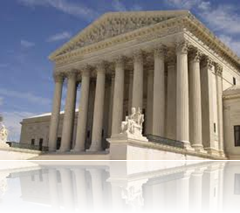Law Isn't Always Right
 Watching The Conspirator the other day, I wondered how our law ever got to the point it is now and if it still needs work. A movie directed by Robert Redford, The Conspirator is about putting on trial co-conspirators of the assassination of Abraham Lincoln.
Watching The Conspirator the other day, I wondered how our law ever got to the point it is now and if it still needs work. A movie directed by Robert Redford, The Conspirator is about putting on trial co-conspirators of the assassination of Abraham Lincoln.
Robin Wright plays the role of Mary Surratt, the mother of John Surratt, a friend of John Wilkes Booth. Mary Surratt runs a boarding house in which John Wilkes Booth and other co-conspirators are documented to have stayed plenty of nights and held meetings to organize a plot to kidnap the president. Obviously, the plan to kidnap the president turns into a plot to kill the president and John Surratt checks out of town.
The assassination went as planned and John Wilkes Booth was hunted down and killed, leaving in his dust several Southern allies who will be found and charged with co-conspiracy, including Mary Surratt. Of course, because of the fact that it was the president who was shot, swift justice is the only way to remedy the situation and to restore confidence in the government, the military and the American way of life.
This brings the discussion of law to light. The movie is based on fact and the trial of Mary Surratt was going to be held by military standards, by military officials, and conducted in a way that would undermine strides that law has made to be righteous. Military standards are very different from civilian standards. Military personnel are property of the U.S. Government and law doesn't have to be conducted in the same manner as a regular court of law.
But, Mary Surratt was not military and even though the trial was about co-conspiring to assassinate the president, Mary Surratt should have been given the same rights as any other civilian charged with a crime. She should have been able to stand trial and be judged by a jury of her peers.
Reverdy Johnson, a Maryland State Senator at the time, argued before the military tribunal that Mary Surratt deserves to have a trial and be given proper counsel. His arguments were what makes our law what it is to this day and it makes the foundation of law look rather weak. But, we get some insight into what makes up our law. We get to see that it hasn't always been right and that people haven't always agreed with it. Johnson's arguments prove that fact because they are after all, basic premises of law. The fact that he even had to argue them makes the whole law system look like it started on some real shaky ground and could have gone either way, the way it did or the way toward dictatorship.
The officials who ran the trial were blood thirsty. Seeing their attitude toward those standing trial, it's a wonder they agreed to anything. The prosecutor had all the leverage he wanted while the defense had very little rope to hang. The prosecutor's objections were sustained while the defense's objections were overruled, without fail. It was a one-sided trial and it was blatantly obvious, not even an attempt to appear unbiased.
It reminds me of another trial. Paul a disciple of Jesus Christ, was arrested by the Jews and handed over to the Romans to be charged with a crime. But, the Jews had no specific crime. In fact, it's interesting to hear how Festus presents Paul's case to King Agrippa, "There is a man here who was left in prison by Felix. When I was in Jerusalem, the chief priests and the elders of the Jews informed me about him and asked for a sentence against him. I told them that it was not the custom of the Romans to hand over anyone before the accused had met the accusers face to face and had been given an opportunity to make a defense against the charge. So when they met here, I lost no time, but on the next day took my seat on the tribunal and ordered the man to be brought. When the accusers stood up, they did not charge him with any of the crimes that I was expecting. Instead they had certain points of disagreement with him about their own religion and about a certain Jesus, who had died, but whom Paul asserted to be alive."
 These arguments are the arguments of law. They establish a documented sense of logic in approach to the law. For reference, Acts 25:13-27 is where you can find them. Festus understood the basic premise of law and how law should be fairly constructed. A charge has to be concrete, not a difference in theology. An accuser has to be able to face his or her accuser. A defense has to be presented. From there, we have further defined these basic premises.
These arguments are the arguments of law. They establish a documented sense of logic in approach to the law. For reference, Acts 25:13-27 is where you can find them. Festus understood the basic premise of law and how law should be fairly constructed. A charge has to be concrete, not a difference in theology. An accuser has to be able to face his or her accuser. A defense has to be presented. From there, we have further defined these basic premises.
A defense can be constructed by a defense expert. The charges have to be substantial and the prosecutor has to prove it. That's what we hold to be our law. Paul got justice. Mary Surratt didn't.
The weakness of our foundation can be seen in the lack of spirit for the law the military officials demonstrated in the "trial" of Mary Surratt. Even her own appointed defense attorney was reluctant at first. He didn't understand why he had to be her defense attorney. He didn't want the people to hate him or to judge him for "taking her side."
He almost mounted a poor defense and at first, tried to get out of being her defense attorney at every turn. That is until Reverdy Johnson gives him an assignment, Mr. Aiken, Mary Surratt's attorney played by James McAvoy, can be released of his duties to defend her if he can prove that she is guilty, a task he soon finds more difficult than it seems.
A person can only be found guilty if the evidence proves beyond the shadow of a doubt. There can't be one ounce of doubt. Even when everything else says yes, not one thing can say no. This is another premise of law.
 It's just that I find it remarkable how law has evolved over the years and how it got to where it is today. It took a few people with some idea of logic to present theories of law to others and to get them to agree. What were they fighting?
It's just that I find it remarkable how law has evolved over the years and how it got to where it is today. It took a few people with some idea of logic to present theories of law to others and to get them to agree. What were they fighting?
The "Shadow of a Doubt" is one thing. How many times have you just known someone was guilty? If the evidence can't prove it, the person might not be so guilty after all. Of course, sometimes the evidence we need can't be found. But, sometimes the evidence we have points to false conclusions.
Having a proper defense is another stipulation they were fighting. The scum of the earth deserves a proper defense. Who we perceive as the scum of the earth just very well may be the most innocent person we know, but we won't without a proper defense.
A defense can be provided by the State. That might seem to run counter to fairness. But, remember that there are three branches of government. The legal system itself technically is not the entity providing indigent individuals with defense attorneys. That money is coming from another source, making them an independent party to the legal system itself, which supplies the court houses, the judges and also the prosecuting attorneys.
But, people who can't afford an attorney have every right to be provided one in criminal cases. Otherwise, our government could easily fill jail cells with indigent people. What good would that do?
Let's see. Let's say there's a case the police can't solve. It would be easy just to pick someone who is poor and charge them with a crime. They would be found guilty and the confidence in the legal system would be restored. That's just one example why the poor must be provided an attorney if they can't afford one.
Let's say there's a community of people the government wants taken off the streets for some reason. Maybe they are living on property where some rich and privileged individual wants to build. Maybe they are driving down the value of real estate in the area. Maybe certain government officials just don't like them at all. It would be easy just to round them up and charge them with fallacious crimes. Who would help them? Who would be there to stop it?
Good thing nothing like that ever happens today…
Author of A Danger to Society, a tale about the notions of law, crime and criminal behavior.
Michael Allen Online
Born in Cedar Rapids, Iowa in 1970, Michael Allen went on to graduate high school from James Monroe in Fredericksburg, Virginia in 1988. He went into the Marine Corps four days later and put himself through college after being Honorably Discharged in 1993. After earning his B.S. in English in 1999 from Frostburg State University, he went on to write A River in the Ocean first as well as the children's book connected to it entitled When You Miss Me. He has also written the psychological thriller The Deeper Dark. ...more
- Michael Allen's profile
- 9 followers



